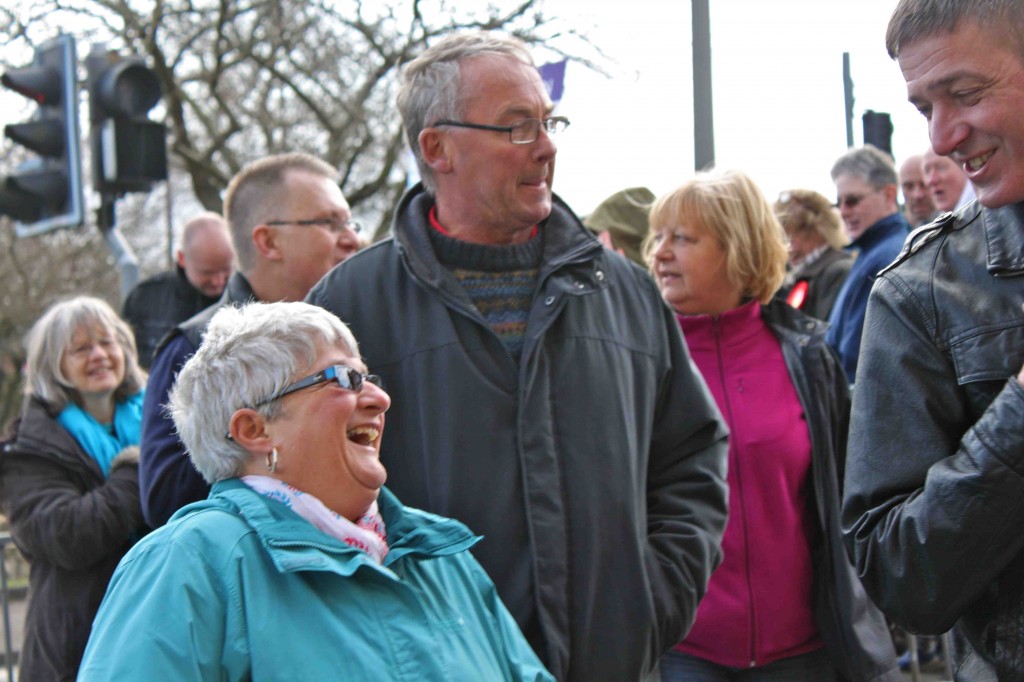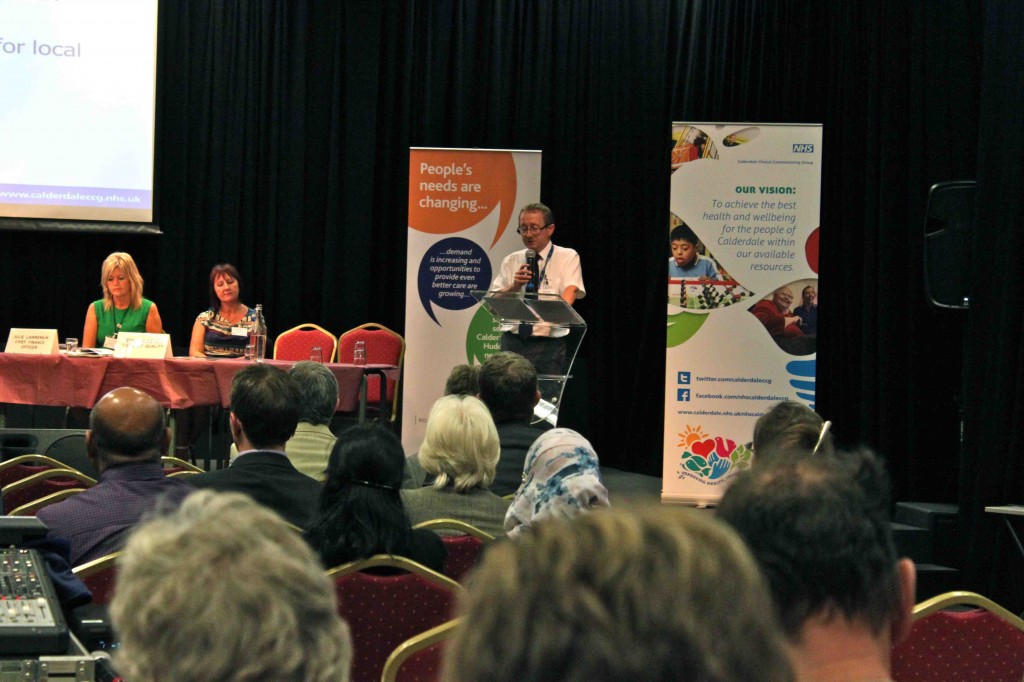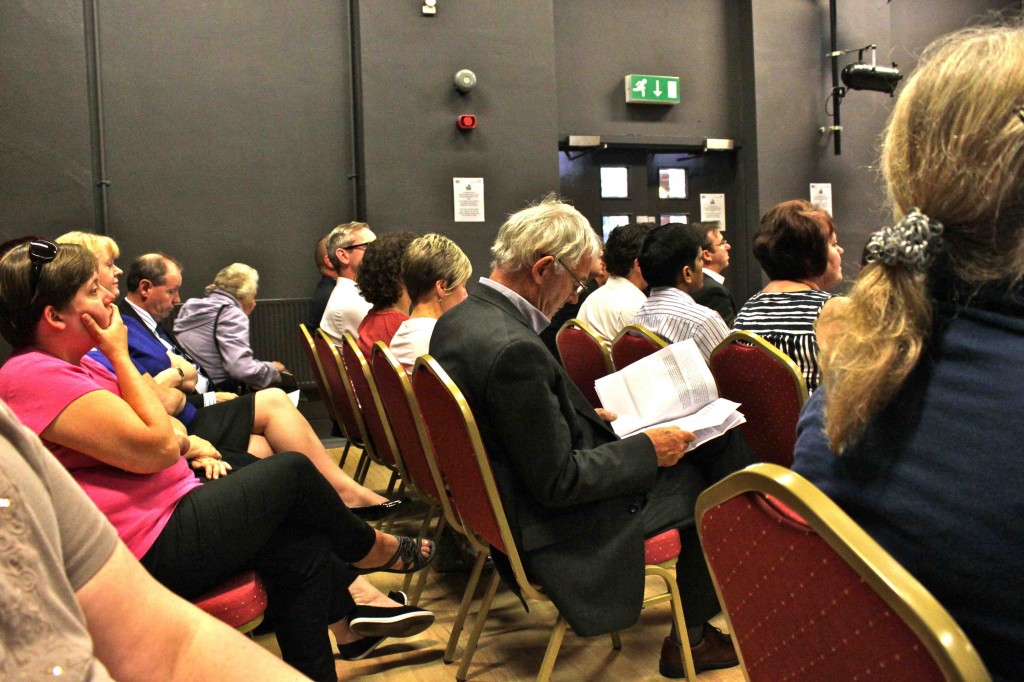Calderdale Clinical Commissioning Group – the organisation that decides what NHS services people in Calderdale have access to, and which organisations provide them – gave a highly selective version of events at its first AGM, held at the Threeways centre in Ovenden yesterday.
The Secretary of State Jeremy Hunt has told NHS clinical staff that they owe a duty of candour to their patients and must tell them the truth.
Surely this duty applies to NHS commissioners as well?
Calderdale CCG failed this test at its AGM.
Airbrushed out – massive public opposition to planned hospital cuts never happened
From Calderdale Clinical Commissioning Group’s Annual General Meeting, you’d never have guessed at the massive public opposition to planned hospital cuts.
For the NHS bosses, the thousands of people on the streets, signing petitions and writing to their councillors and MPs don’t exist.
They didn’t bother to mention us.
Or that the CCG public “engagement” events about the proposed hospital cuts were poorly advertised and poorly attended, or that people who did attend them found that information was unclear, and staff couldn’t answer their questions and didn’t make any note of their comments unless specifically asked to do so.
Or that the CCG has failed to hold the scheduled public consultation on the NHS shake up plans, that include proposals to:
- close CRH A&E and replace it with a minor injuries unit, sending all A&E patients to Huddersfield or possibly to Leeds, if HRI A&E were also to close
- move all acute services including acute maternity and paediatric care to Huddersfield Royal Infirmary
- turn CRH into a small planned care clinic with around 87 beds, without saying what will happen to the remaining 350+ beds
- cut over 100 acute hospital beds across both sites
- replace the cut hospital services with a system of care in the community imported from private American health care companies like Kaiser Permanente
Or that there has been sustained, massive public opposition to the plans to cut hospital services since they were announced in the winter – to the point where Dr Brook announced last month that he was tired of talking about hospitals, and the Commissioners decided to introduce the new care in the community system, re-branded as Care Closer to Home, without any public consultation.
Or that doing this would make the hospital cuts inevitable, since the CCG has been plain that there isn’t enough money to pay for both the new community care system and existing hospital services.
Or that Calderdale Council’s Adults Health and Social Care Scrutiny Panel wrote to the CCG asking it not to make this decision, but the CCG went ahead and made it anyway.
Or that Dr Matt Walsh was forced to admit that if the Council tells them to consult the public about their plans to set up the new community care system, they will have to do this.
Or that Calderdale Council’s AHSC Scrutiny Panel is calling in Calderdale CCG to its 17th September meeting at 6pm in Halifax Town Hall to explain what they’re doing.
Or that Calderdale and Kirklees Council’s Joint Health Overview Scrutiny Committee is meeting on 22nd September at 10am in Huddersfield Town Hall to consider how to call in both Calderdale and Huddersfield CCGs to explain what they’re up to.
Or that the public is not allowed to see the hospitals Trust’s Outline Business Case for the proposed hospital cuts and the replacement of hospital services by the new community care system. Because the Trust says it’s commercially confidential and if rival providers had sight of it they could use its information, when the CCG puts the services out to competitive tender.
Or that the proposed new care in the community system risks destabilising the hospitals Trust, if the community care services are taken away from the Trust and contracted to private providers.
Other facts that the NHS commissioners didn’t tell the AGM
Dr Brook didn’t mention that:
The £1m Loneliness Project was criticised by a public health professor on the grounds that it’s not based on any evidence.
The Quest for Quality in Care Homes scheme similarly lacks an evidence base for the efficiency and effectiveness of the telehealth and telecare methods that it relies on.
The CCG has contracted Wheelchair Services out to a private contractor; this reprocurement was justified by cherry-picking evidence from “engagement” with wheelchair users and ignoring the overall feedback from users, that the existing service provided by the hospitals Trust was good.
Members of the public were thin on the ground at poorly advertised meeting
People in Ovenden were left in the dark about the NHS bosses’ meeting in the Threeways centre on their doorstep.
Calderdale Clinical Commissioning Group didn’t bother to put any information in local newsletters about their first Annual General Meeting, and there were no posters or signs on the streets to direct people to the meeting.
The proportion of people with poor health who need the NHS is higher in North Halifax than anywhere else in Calderdale, so you’d think that the NHS commissioners would want to encourage as many people from the area to come and have their say.
Still, the NHS Commissioners’ Governing Body Chair, Dr Brook, told the AGM that the CCG welcomed public attendance at their meetings.
But a CCG staff member ordered me out of the conference hall when I stood by the door handing out leaflets opposing the planned hospital cuts.
When he introduced the written questions sent in by the public, Dr Brook said public questions were not “an opportunity to repeat personal views”, so the Commissioners had:
“edited down questions, in line with my comments to the last Governing Body meeting.”
He didn’t explain what he’d said to the last Governing Body, but this was a reference to a bit of a rant by Dr Brook, when he ordered the public to only ask “appropriate” questions.
At a rough count, about 100 people were in the audience.
But actual members of the public were thin on the ground.
Which, given the lack of news and street signs about the Annual General Meeting, was presumably what the NHS commissioners wanted.
The Leader of Calderdale Council was there, as well as Labour and LibDem Council leaders and Cllr Malcolm James, Chair of Calderdale Council Adults Health and Social Care Scrutiny Panel.
From the name tags, most of those present were NHS admin staff, GPs and practice managers, and staff from the charities and community groups funded by Calderdale Clinical Commissioning Group.
These included organisations like Overgate Hospice, Food for Life, Calderdale Parents and Carers, Community Transport Calderdale and Home Start Calderdale.
The charities and community groups had exhibitions in a room that Dr Brook called the “marketplace”.
This is what NHS Calderdale has become, under the NHS privatising law that set up the Clinical Commissioning Group, and requires them to put NHS services out to tender to private health care companies.
A law that has no democratic mandate, since it was not in any party’s election manifesto.
The people’s fight for the NHS is also the people’s fight for democracy.
Public questions at AGM
Three members of the public submitted written questions and there were no questions from the floor.
Only one question was not “edited down” by the NHS bosses.
It read like a question that had been planted in order to allow the CCG to trumpet their planned “care in the community” system – which is part of the NHS shake up plans, called Right Care Right Place Right Time.
That’s the care in the community system they’ve decided to introduce now, without public consultation.
But after the AGM Cllr Janet Battye, the Leader of the Libdems at Calderdale Council, assured me the question was not planted, because she knows the person who asked it.
This uncensored question went along these lines:
“For a person with a life-long co-morbid condition diagnosis who needs both NHS and social care support, how can the patient know where to turn to for help, given the fragmented nature of the various services they need to access?”
Dr Matt Walsh, the CCG Chief Officer, gushed,
“This goes to the heart of the aims of our Right Care proposals.
For too long the NHS and social care services have been fragmented.
We are determined to prioritise this.
We’re really clear that this is our first focus and we will work closely with all our partners, particularly our Council colleagues in the Better Care Fund. This is our focus this year.”
This last point was also made by Dr Brook in his presentation, when he said that the CCG would use the Better Care Fund to develop the community care system, now re-branded from “Right Care” to “Care Closer to Home.”
The Better Care Fund is a new central government fund that takes NHS money and puts it into social care, which has lost huge amounts of its funding because of central government cuts to local authorities’ budgets.
It requires Clinical Commissioning Groups and Councils to agree on how to co-commission a range of NHS and social care services for people with long term illnesses.
Other public questions included:
Q: Will the CCG put a clause in contracts with private providers that any remedial matters are the responsibility of the provider not the CCG?
A: There is already a liability and indemnity clause in all contracts, whether with NHS or private providers, which would allow the CCG to recover any loss from any provider
Q: What proportion of contracts go to different categories of providers and will the CCG publicise this information better?
A: CCG wants to commission health services from non-NHS and NHS providers; there is a legislative framework about commissioning services that they have to comply with; the CCG regularly publish a contracts register and this will also now include upcoming tenders and an explanation of how contacts have been awarded
Q: What is the contractual position of GPs in relation to private contractors taking over GPs practices?
A: At the moment NHS England is responsible for GP contracts, although there are now proposals for NHS England and the CCGs to co-commission GPs. But at the moment GP contracts are completely held by NHS England. So no comment.
However, Dr David Wrigley, a Lancaster GP and co-author of the book NHS SOS, has published information on the Open Democracy website about NHS England’s recent statement that,
“because of competition law, all new GP contracts will have to be opened up to bids from the profit-making, private corporate sector. And – whilst struggling under funding cuts – they will have to fight off the private sector to keep their practice every 5 years. They will all be forced into contracts as ‘Alternative Providers of Medical Services’. This was a new concept introduced by New Labour in 2004. It allowed contracts to be held by the private sector, including by non-GPs.”
There were about three more questions but they were pretty inconsequential. If you want to read them they should soon be on Calderdale CCG website, along with the answers.
You can read Calderdale CCG’s and Calderdale Council’s Better Care Fund plans here.
Updated 16th September 2014 with info from Dr David Wrigley about NHS England’s statement that all GP practices will have to open to private sector competition.




Glad to read this account – our Airedale, Wharfedale and Craven CCG holds its AGM next Thursday – we have to book to attend – ostensibly because a ‘lunch’ is offered. Advance notice was one small paragraph in the local paper a week ago. This is the first meeting I have seen advertised since attending a small public meeting when they started a year. The public’s representatives at that meeting were clearly in a cosy relationship with the CCG. Since then – virtual silence.but a petition to support the retention of rural GP practices has appeared in our medical centre.
Over a week later, I’m still waiting for the minutes to arrive from the ‘People’s Commision’ meeting I attended at Hebden Bridge Town Hall. This is too long to wait when the next P.C is due soon.